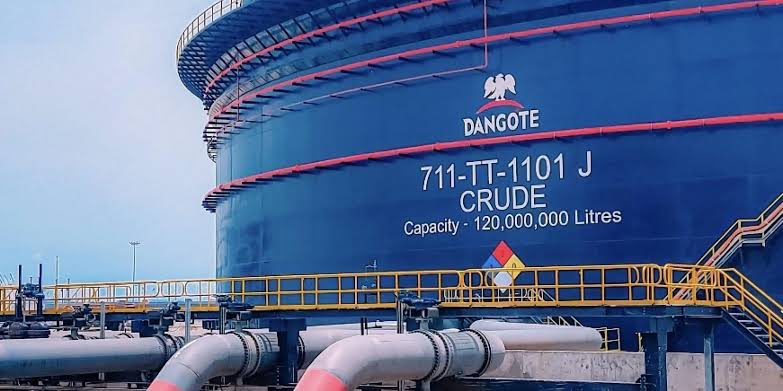In a major boost to Nigeria’s oil industry, the Dangote Refinery, a colossal $19 billion investment, is set to begin fuel production following the arrival of the first crude oil shipment from Agbami. This development represents a significant milestone for the project and the country’s energy sector.
According to a report by S&P Global on spglobal.com, which cites industry sources and utilizes tanker tracking data, the OTIS tanker, laden with a 950,000-barrel cargo of Nigeria’s Agbami crude oil, departed on December 6. It is currently navigating towards Lekki, the closest coastal port to Dangote’s offshore crude receiving facility.
The tanker is scheduled to dock on December 7 at around 8 pm. This delivery signifies the commencement of crude oil supplies essential for the operational start-up of the refinery.
Chartered by the Nigerian National Petroleum Company (NNPC), the Suezmax tanker represents the inaugural crude shipment to Dangote’s advanced refinery, preparing to begin its production phase. This detail was shared by a West African oil trader with insight into the matter, as reported by S&P Global.
Despite the official completion of the refinery in May, the absence of local crude oil supply hindered the production of oil products. The Nigerian National Petroleum Corporation (NNPC), holding a 20% stake in the refinery, recently finalized a deal to provide the Dangote refinery with 6 million barrels of crude oil in December. This agreement is a strategic move to initiate the refinery’s operations.
The Agbami field, managed by Chevron, is a prominent deep-water operation in Nigeria, located in the central region of the Niger Delta. It is notable for its production of around 100,000 barrels per day. The field produces a light, sweet crude oil, characterized by a specific gravity of 47.9 API and a low Sulphur content of 0.04%. This type of crude is particularly rich in naphtha and kerosene.
The NNPC has arranged for additional shipments of crude oil from various offshore fields in Nigeria to be delivered to the refinery. This marks the start of a sequence of planned crude oil deliveries for this month, as reported by an oil trading expert.
Located near Lagos, Nigeria’s bustling commercial center, the Dangote Refinery has experienced several delays since its announcement in 2013. However, significant progress in its construction was noted in 2019, despite these setbacks.
The Dangote Refinery is engineered to simultaneously process different types of crude oil. It is specifically geared to refine three Nigerian crude varieties: Escravos, Bonny Light, and Forcados. When operating at full capacity, the facility is expected to produce daily outputs of 327,000 barrels of gasoline, 244,000 barrels of diesel, 56,000 barrels of jet fuel/kerosene, and 290,000 metric tons of propane/LPG per year.
The initiation of operations at the Dangote Refinery is a hopeful development for Nigeria’s ambition to lessen its dependence on imported gasoline. This change is anticipated to significantly impact the country’s oil industry, potentially leading Nigeria to self-sufficiency in gasoline production by the 2040s, particularly as the nation’s current refineries undergo repairs.
In a recent development, officials from Dangote Industries have projected an initial output of 370,000 barrels per day for their new refinery, with a primary focus on producing jet fuel and diesel. Industry analysts, however, have a more cautious outlook. They anticipate that the refinery will reach its full operational capacity by mid-2025. Despite this optimism, there are concerns about potential delays that could affect this timeline. The successful operation of the refinery is expected to have significant implications for the energy sector.



